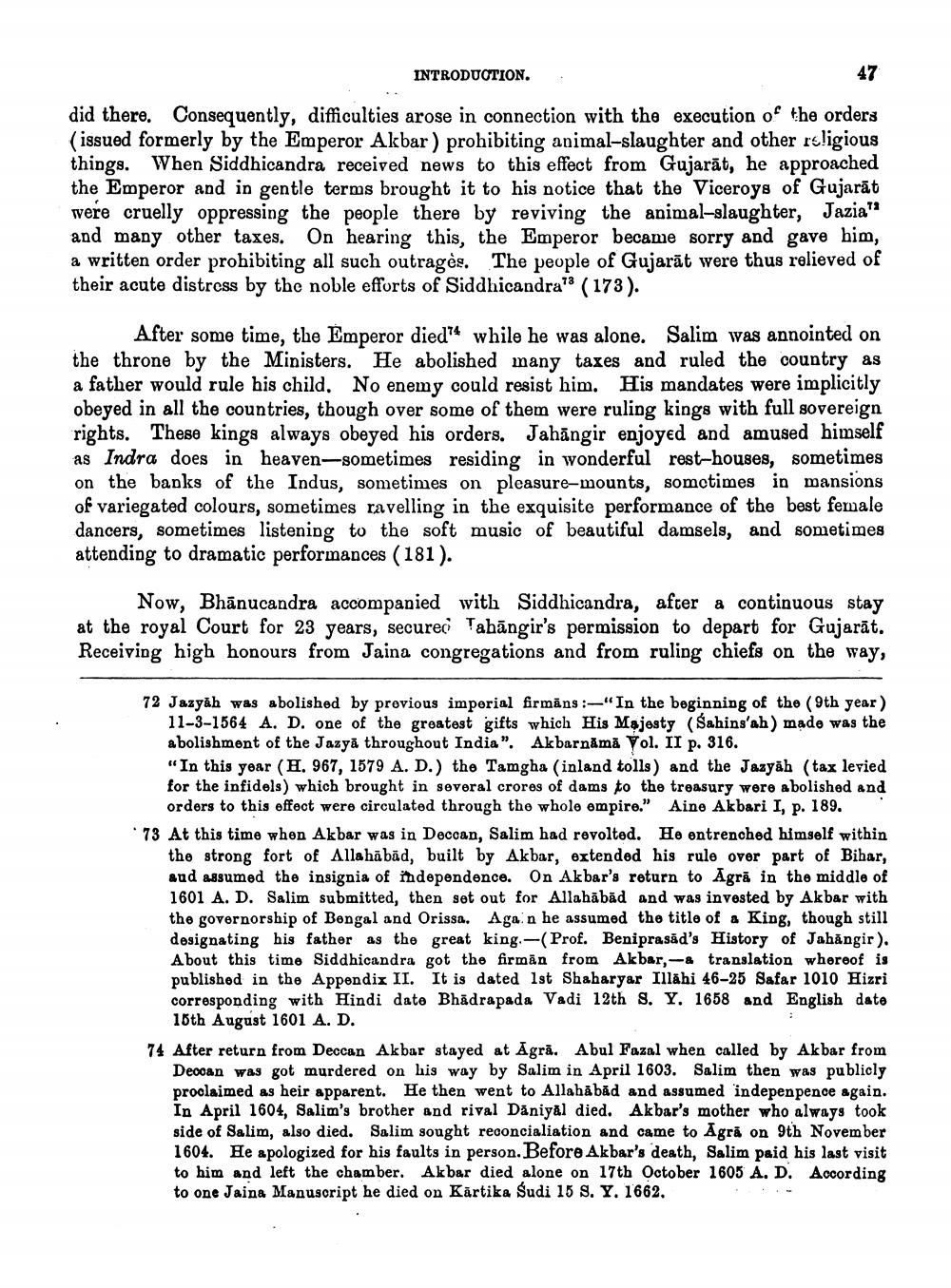________________
INTRODUCTION.
did there. Consequently, difficulties arose in connection with the execution of the orders (issued formerly by the Emperor Akbar) prohibiting animal-slaughter and other religious things. When Siddhicandra received news to this effect from Gujarāt, he approached the Emperor and in gentle terms brought it to his notice that the Viceroys of Gujarāt were cruelly oppressing the people there by reviving the animal-slaughter, Jazia" and many other taxes. On hearing this, the Emperor became sorry and gave him, a written order prohibiting all such outrages. The people of Gujarāt were thus relieved of their acute distress by the noble efforts of Siddhicandra? (173).
After some time, the Emperor died?4 while he was alone. Salim was annointed on the throne by the Ministers. He abolished many taxes and ruled the country as a father would rule his child. No enemy could resist him. His mandates were implicitly obeyed in all the countries, though over some of them were ruling kings with full sovereign rights. These kings always obeyed his orders. Jahāngir enjoyed and amused himself as Indra does in heaven-sometimes residing in wonderful rest-houses, sometimes on the banks of the Indus, sometimes on pleasure-mounts, sometimes in mansions of variegated colours, sometimes ravelling in the exquisite performance of the best female dancers, sometimes listening to the soft music of beautiful damsels, and sometimes attending to dramatic performances (181).
Now, Bhānucandra accompanied with Siddhicandra, after a continuous stay at the royal Court for 23 years, secured Tabāngir's permission to depart for Gujarāt. Receiving high honours from Jaina congregations and from ruling chiefs on the way,
72 Jazyah was abolished by previous imperial firmāns :-"In the beginning of the (9th year)
11-3-1564 A. D. one of the greatest gifts which His Majesty (Sahins'ah) made was the abolishment of the Jazya throughout India". Akbarnămă Vol. II p. 316. "In this year (H. 967, 1579 A. D.) the Tamgha (inland tolls) and the Jazyah (tax levied for the infidels) which brought in several crores of dams to the treasury were abolished and
orders to this effect were circulated through the whole empire." Aine Akbari I, p. 189. * 73 At this time when Akbar was in Deccan, Salim had revolted. He entrenched himself within
the strong fort of Allahābād, built by Akbar, extended his rule over part of Bihar, aud assumed the insignia of independence. On Akbar's return to Agră in the middle of 1601 A. D. Salim submitted, then set out for Allahābād and was invested by Akbar with the governorship of Bengal and Orissa. Again he assumed the title of a King, though still designating his father as the great king.-(Prof. Beniprasād's History of Jahăngir). About this time Siddhicandra got the firmān from Akbar,-& translation whereof is published in the Appendix II. It is dated 1st Shaharyar Illahi 46-25 Safar 1010 Hizri corresponding with Hindi date Bhādrapada Vadi 12th S. Y. 1658 and English date
16th August 1601 A. D. 74 After return from Deccan Akbar stayed at Agrā. Abul Fazal when called by Akbar from
Decoan was got murdered on his way by Salim in April 1603. Salim then was publicly proclaimed as heir apparent. He then went to Allahābād and assumed indepenpence again. In April 1604, Salim's brother and rival Daniyal died. Akbar's mother who always took side of Salim, also died. Salim sought reconcialiation and came to Agrā on 9th November 1604. He apologized for his faults in person. Before Akbar's death, Salim paid his last visit to him and left the chamber. Akbar died alone on 17th October 1605 A. D. According to one Jaina Manuscript he died on Kārtika Sudi 15 8. Y. 1662,




